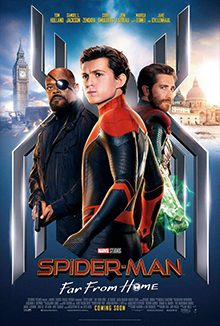Spider-Man: Far From Home
 |
| Property of Marvel Studios |
The last night of my time at Repeat Offenders, we topped off our two week workshop by going to see a film that had just arrived in theaters: Spider-Man: Far From Home. The first film to follow the MCU's phase three finale, Endgame, it carries on the series' action-packed, character-building storytelling.
Having only experienced Tom Holland's incarnation of Spider-Man through the present MCU timeline (which, let's be honest, is a mess), I didn't know what to expect from this film. I hadn't seen his previous "solo" venture, but from what I have seen, I find him enjoyable. His performance in this film, along with the rest of the cast, is incredibly believable, despite superhero situation. He, and the rest of his high school castmates, actually seem like real teenagers, dealing with all the horrors adolescence can sling at you.
(I won't spoil the film for anyone. But I will say, anyone who has minimal knowledge of Spider-Man's famous rogue's gallery will see its major twist coming a mile away.)
Because we were all writers in the audience, after we watched the film, we discussed a bit about how the story was put together and what made it such an enjoyable film. The biggest point I noted after seeing it was how satisfying the film's conclusion was. I put this quality down to one factor. Throughout the story, the screenwriters of the movie, Chris McKenna and Erik Somers, never made things easy for our favorite web-slinging hero.
Kurt Vonnegut, author of Slaughterhouse-Five and other great works, had a series of guidelines--there are no real, hard and fast rules in the art of fiction writing--from which, he believed, any writer with decent talent could craft a good short story. (See the video below for the whole list, provided to you by Vonnegut himself.)
My favorite among them--one I've often referenced on this blog--is rule number 6, which reads as such:
"Be a Sadist. No matter how sweet and innocent your leading characters, make awful things happen to them in order that the reader may see what they are made of."
Forcing a character into tight corners, seemingly impossible conundrums, or apparently insurmountable odds is the cornerstone of good storytelling. When you force a character to work their way out of a conflict, the overcoming of those odds make us empathize with that character and feel satisfied at the story's conclusion.
I'm not sure if McKenna and Somers were aware of this rule's existence when writing the screenplay (I'm sure they did), but if they didn't, they understood instinctually that making things hard for their characters is what compels us, the viewers, to keep watching and caring about the outcome.
And Sweet Baby Jesus, did they torture poor Spidey.
Let's briefly list all the things they put in our favorite neighborhood hero's way:
1) They make him an awkward, nerdy, 16-year-old high schooler, bent on confessing his feelings to MJ.
2) They provide him with a much cooler--though admittedly seedier--rival for his crush's affections.
3) They provide him with a major inferiority complex about his abilities in a Post-Blip, Post-Iron Man World
4) They make him the only available Avenger left on Earth in a Post-Blip World
5) They place an enormous amount of pressure on him from the wider-world.
6) They give him a highly intelligent and dangerous foe to combat
And, to top things off, 7) They make it a constant challenge for him to keep his secret identity a secret.
(And those are the ones I picked up after just a single viewing.)
People hate having conflict in their lives. Stability, routine, and peace, with the occasional splash of adventure, are what most people seek. (There are exceptions, of course.) Because of that, however, we love conflict in the fiction we consume. In fact, we crave it to the point that if a book lacks any discernable conflict, no matter the quality of the prose, we put it down. This desire is what compels people who love thrillers, mysteries, and romances to read them obsessively. Why? Because we want to see our protagonist succeed, and since they are human, like us, if they can succeed, then perhaps we can too.
By the end of the ,movie, Spider-Man more than earns the outcome he achieves because of all the punishment he's had to endure to achieve it. This, of course, isn't the end of the story. However, if future screenwriters continue to heed the example this film gives us about earning satifying endings, I have a feeling we'll be watching these movies for a good long time.


Comments